|
It
was
a
pleasure
to
see
American
tenor
Michael
Fabiano
again
on
the
San
Francisco
Opera
stage,
this
time
in
an
imported
production
(from
Rome)
of
Verdi's Un Ballo in Maschera (A Masked Ball).
Fabiano
was
not
only
in
splendid
vocal
form
but
appeared
embodied,
relaxed,
at
ease,
in
the
role
of
Gustavus
III,
the
Swedish
king
who
was
assassinated
at
a
masked
ball
at
the
Stockholm
Opera,
in
1792.
Gone
was
the
lyrical
tenor's
awkwardness
and
stiffness
that
still
marked
the
last
few
times
I
saw
him
(in Don Carlos andManon at SF Opera, reviewed in these pages, and in La Traviata at
the
Met).
It
seemed
like
an
artistic
development
toward
a
fully
rounded
stage
presence
that
will
be
interesting
to
watch.
The new Ballo was given in the "Stockholm Version" which sets the drama at the royal court in Stockholm, as Verdi originally intended. Gustavus III was an "enlightened monarch" with a highly cultivated court—a fact that stage director Leo Muscato (in his SF debut) hints at with many paintings in many scenes.
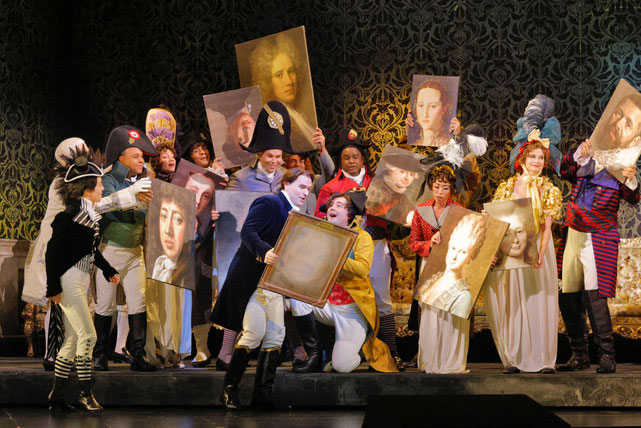
Gustavus III, who built the Stockholm Opera and founded the Swedish
Academy that accords the Nobel prizes, tried to be a king of the people and
was eliminated by a cabal of aristocrats. But Verdi was not interested in the
politics of the monarch. Based on a libretto by Eug猫ne Scribe for an 1833
opera by Daniel Auber, Gustavus III ou Le bal masqu茅, Verdi created a life
-loving, insouciant Gustavus in a love triangle with Amelia, the wife of his
most trusted courtier, Renato. The Italian censors, however, wouldn't
tolerate a regicide onstage after the 1848 revolution. They also objected to
the king's page Oscar, a pivotal soprano role. A scene in the brilliant biopic
series The Life of Verdi shows the composer (played by Ronald Pickup)
making fun of the censors. He sings what they suggested: the frivolous
page boy as a soldier with a good, strong baritone voice.
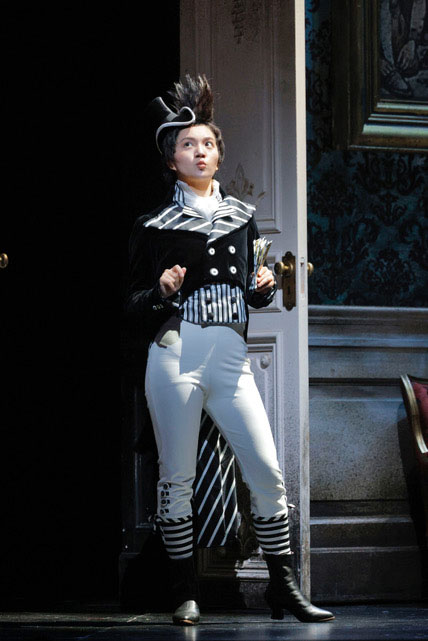
After a two-year battle, Verdi had to give in, but he retained his Oscar—the
only trouser role in his 26 operas. In 1859, Un Ballo in Maschera
premiered to general acclaim as the less incendiary story of a Duke in far
-off (far-fetched) colonial Boston. Recent operatic style has reverted to
King Gustavus III, and both versions are performed today with minimal
libretto changes.
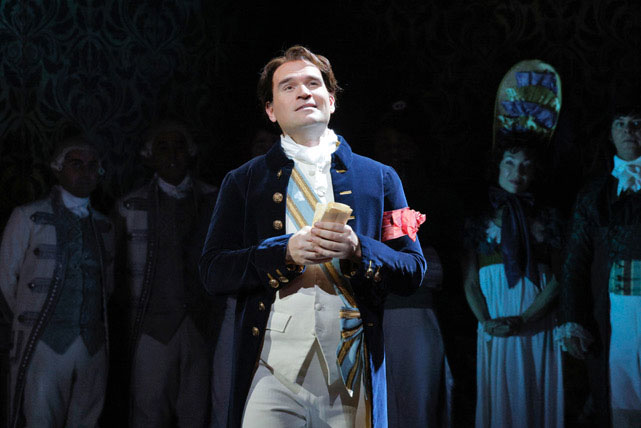
SF Opera's production stood out with excellent voices in the entire cast
(several Adler Fellows among them). Apart from lyrical tenor Fabiano as
Gustavus III, Mongolian baritone Amartuvshin Enkhbat (in his SF debut)
was his friend and ultimate assassin, Renato His wife Amelia, who secretly
loves the king, was Armenian soprano Lianna Haroutounian. The fortune
-teller Ulrica was sung by Romanian mezzo soprano Judit Kutasi (who
made a strong company debut in last year's Lohengrin, reviewed in these
pages). Oddly, the historical Gustavus consulted a fortune-teller named
Ulrica, who also predicted his death. Oscar was charmingly sung and acted
by Chinese coloratura soprano Mei Gui Zhang in her role debut—a young
star in the making. Last but not least, the massive chorus was impeccable as
always at SF Opera. The simple but pretty sets on a turning stage were by
Federica Parolini. The costumes, by Silvia Aymonino, were on the sober
side except for Oscar who was dressed liked a fashionable commedia
dell'arte character.
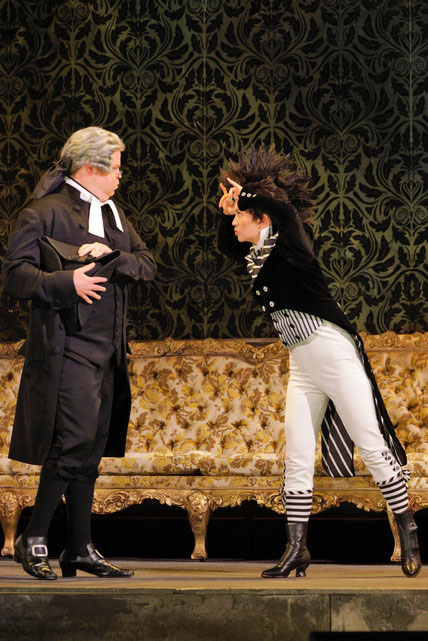
Music Director Eun Sun Kim kept a brisk tempo, highlighting the light
-hearted "Offenbachian" notes of comedy and leaning into the lavish,
sweeping melodies that run through the entire score. Leo Muscato's very
basic, traditional directing, however, did not always match the height of
Verdi's comedy and drama.
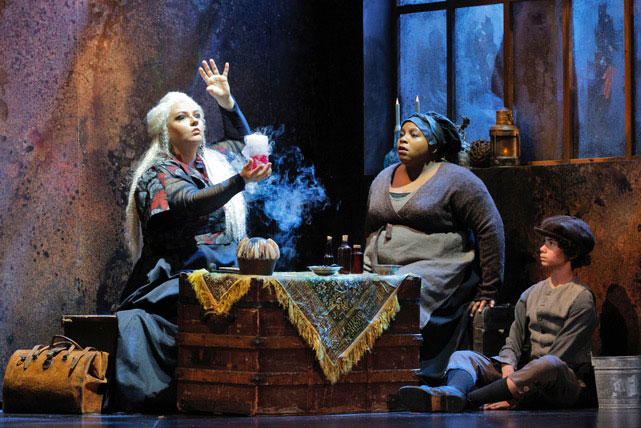
The soloists and the chorus stayed in place most of the time and acted with
stock gestures. Luckily, Oscar flitted around like a hummingbird, a relief
from the immobility of the scenes. With a better direction, Fabiano's
pleasing Gustavus would have had twice the fun he showed in his disguise
as a fisherman at Ulrica's den, where he takes the court to test her fortune
-telling skills. She reads in his hand that he will die, killed by the first
person who will shake his hand. Verdi gives an extended aria to this
revelation: Gustavus, who feels secure in the love of his people, laughs off
the prophecy between brief pensive moments. A more pointed and defiant
insouciance in Fabiano's acting would have added to the suspense of the
scene.
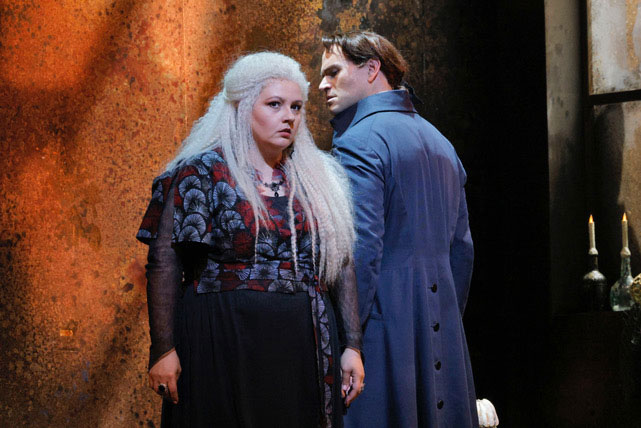
The poor mobility and acting became problematic in Act II, in the love
scene. Amelia has secretly visited Ulrica, asking for a remedy against her
illicit feelings for the king. She must go to the gallows at midnight, alone, to
pick an herb that will "change her heart." We see her staggering in horror
between naked tree stumps, and just when she has perhaps spotted the vile
herb (the billowing fog turns green), Gustavus appears. He has overheard
her confession with Ulrica and now wants to hear her say to him just once
that she loves him, too.
What a moment in the hands of a master like Verdi. The sea-saw of desire
and guilt, fear and pleading, urgency and resistance is a fantastic brew.
That both Fabiano and Haroutounian sing with intensity is not quite
enough to transmit Verdi's passion. They are standing mostly apart, more
like a married couple in an argument. Amelia's confession of love rises to a
long sweep of ecstasy, but there is no chemistry between them. Twice the
infatuated couple holds hands with outstretched arms; twice he lightly
touches her shoulders, and that's all. No desperate clasping, no swooning,
not even a final kiss. (As if by design, there aren't any production photos of
this scene.)
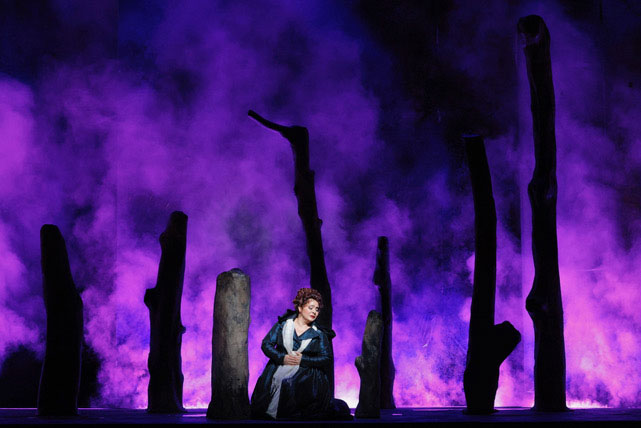
Renato barges in to save the king from the conspirators on his heels. While
he dons the royal mantle to distract the men, Gustavus gets away. His
veiled lady, however, left in Renato's care, is revealed to be Renato's wife. A
secret tryst under the gallows between old spouses ? The mocking laughter
of the men could have been more cutting, Renato's humiliation and
Amelia's shame more searing.
If you want to see what can be done with the explosive emotions of this
story, you must turn to the best on video. YouTube provides the exemplary:
Placido Domingo and Katia Ricciarelli in a production by Otto Schenk,
conducted by Claudio Abbado at the Royal Opera, in 1975. The image is not
in HD, but the sound is excellent. You see, hear, feel the striking gap
between a good production of Ballo and a great one.
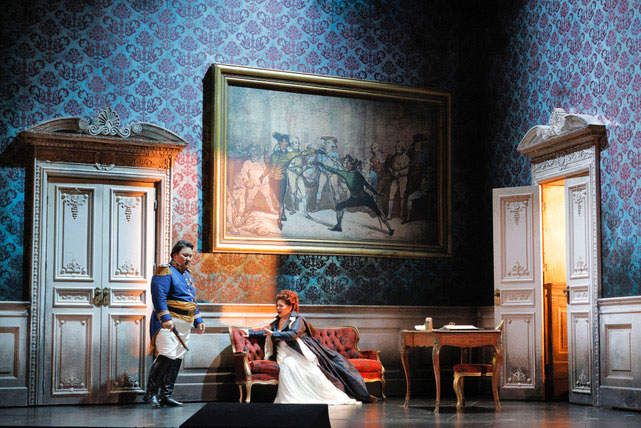
The last act fared better as the action sped up toward the ball scene.
Amelia's remorse-filled pleas to let her say good-bye to her son before
dying, are granted. Renato, who can't conceive of her sexual innocence (has
any operatic bully ever managed the opposite?) pours out his grief.
Enkhbat's big, burnished baritone has an emotional effect. He then turns
his vengeance against the king, invites the conspirators, and a marvelous
quartet ensues, with Amelia forced to draw the name of the chosen assassin
from a bowl: Renato. The scene shifts to the King's remorse and his heart
-sick resolve to renounce his passion and send Renato with Amelia to a
different post abroad. A letter from an unknown lady warns him of his
mortal danger, in vain. The ball begins. The scene is animated only by a few
ballet couples. As Gustavus and Amelia say their final good-bye, the shot
rings out.
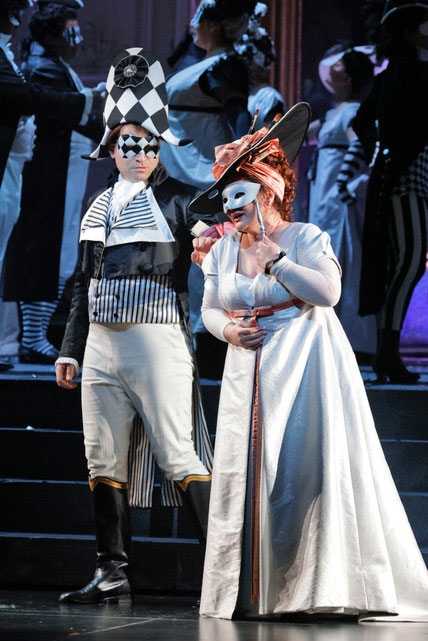
Fabiano now has his grand finale, the king's extended dying, with time to
declare his love for Amelia "pure." He forgives Renato (as the real
Gustavus III forgave his assassin). His singing here is stellar, beautifully
modulated between passion and grief. In moments he sings with a breaking
voice that culminates in a high-C in his justly acclaimed, sublime
pianissimo.
Photos: Cory Weaver
|